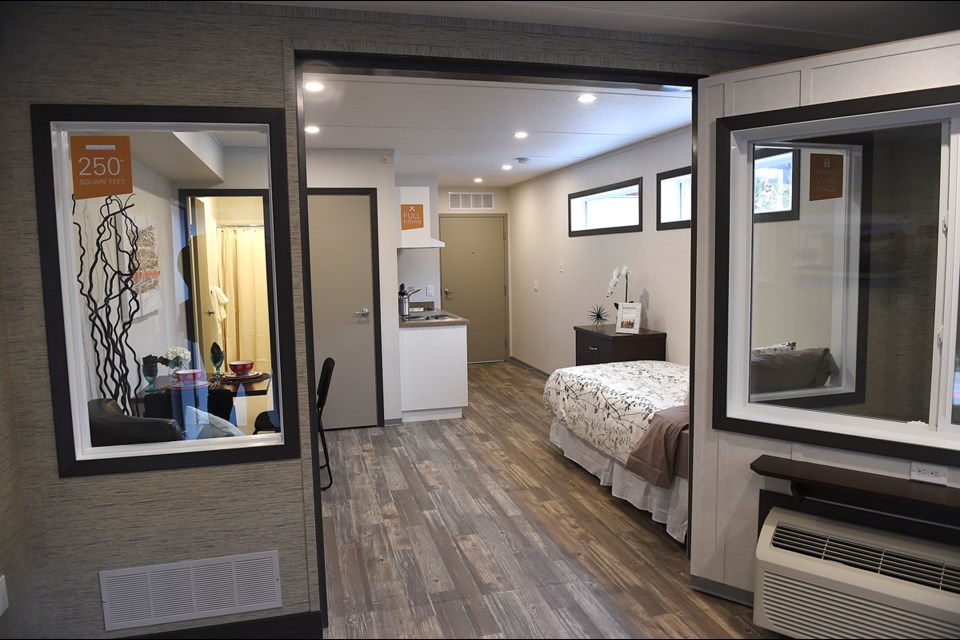The 250-square-foot space is compact, with room for a bed, small dining table and a couple of pieces of furniture. It features a basic kitchen, a washroom with a shower and a closet.
City of Vancouver officials see the modest unit — a model suite for its first temporary modular housing pilot project that’s going in at 1500 Main St. — as a housing form full of possibilities in a city struggling with an affordability crisis.
The suite, unveiled to the press Monday, is on display to the public at Robson Square until Nov. 1 as the city hosts its Re:Address Housing Affordability summit, which runs until Oct. 29. Forty of the units, which cost between $80,000 and $90,000 a piece to build, are being constructed offsite at a factory in Kamloops by a company called Horizon North. They will be transported to city-owned land at 1500 Main and assembled into a three-storey housing complex that will remain in place for three to five years until it has to be relocated.
The units have been earmarked for people on low and fixed incomes.
Jeff Thomas, Horizon North’s vice president of sales and marketing, said the advantage of modular housing is that it can be built offsite more quickly, with higher quality and more cost certainty than could be done onsite with a non-modular construction technique.
It can also be dismantled, transported and re-assembled on another site at a fraction of the cost of building a new building, he said.
Another level or individual modules can be added or taken away with minor tweaking to the exterior depending on what’s required at a new site.
“When we move it, it’s very flexible in its layout, so we’ll be able to reconfigure [the modules]. If the next space it goes in doesn’t fit that same footprint, we’ll be able to reconfigure it and set up the same number of units in a different configuration. So the technology behind that, including the foundation, is fairly unique,” he said.
Project manager Brock Elliott said the foundation is not a poured concrete foundation that’s typically used. It’s called a multi-point foundation.
“It’s similar almost to scaffolding when you visualize it. It’s totally reusable, no impact on the ground,” he said.
The whole building — from transport to assembly onsite — takes about 45 days, according to Elliott.
There will be an accessible entrance on the front and some accessible units on the main floor. Inside, units will feature items such as individual climate control and some LED lighting fixtures.
“We’re currently speaking with [the Vancouver Affordable Housing Agency] about adding in some occupancy sensors and those types of things just to reduce energy consumption,” added Elliott.
“And everything on there — from our ramps through to our recycling containers through to our paving stones — will all be able to be easily relocated to another site.”
Horizon North will start building the units Nov. 16. Installation will begin on the site in mid-December.
“It’s wonderful to be able to showcase part of Vancouver’s housing future, particularly in the near-term as we face an affordable housing crisis in the city,” said Mayor Gregor Robertson who’s encouraging the public to check out the model suite. “We have an opportunity now, right in the centre of downtown, for people to see what modular housing is, how far it’s come.”
Mukhtar Latif, the city’s chief housing officer and CEO of the Vancouver Affordable Housing Agency, said although the agency has been mandated to build 2,500 permanent housing units within the city by 2021 using city sites, that will take several years to build out and this offers a solution in the meantime.
“The idea is to use the vacant land we have in the city to be able to create some short-term solutions to fix some of the immediate housing needs that we have within the city,” he said.
When asked if modular housing could be an option in the future for people other than those transitioning out of homelessness such as students or working people, Robertson said it’s something to consider.
“We see an immediate need for modular housing to address homelessness and people on very low incomes who can find no place to live in Vancouver right now. Whether it’s appropriate on some sites for student housing or lower income housing remains a question. We want to see how it goes initially, with people who need it the most, and how acceptable it is to the residents of the city. We want to be sure that there’s a good fit here,” the mayor said.
noconnor@vancourier.com
@naoibh



